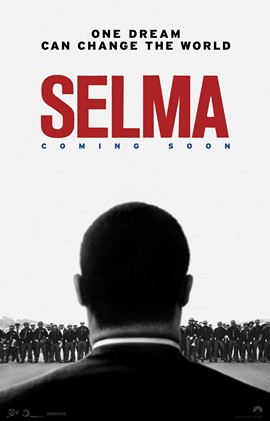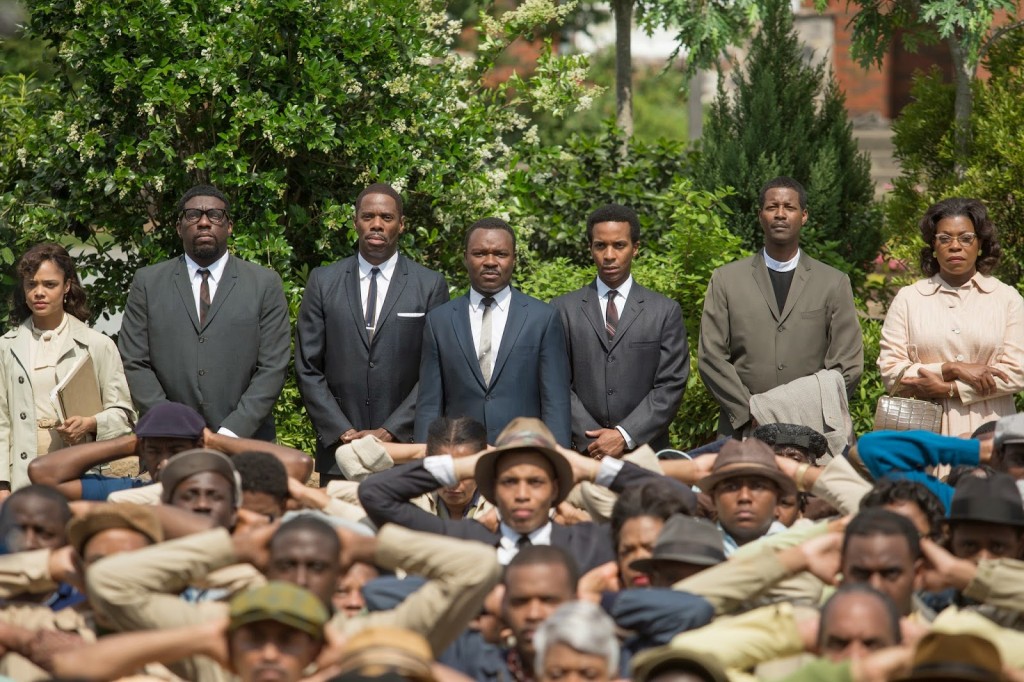
It would be easy to just say that “Selma” is simply a Dr. Martin Luther King Jr. biopic or is about the Voters’ Rights demonstrations and marches that started in Selma, Alabama, but actually this movie is taking on a number of topics, including the point and purpose of non-violent protests, a behind the scenes look at the machinations of such a demonstration, a peek behind the curtain of the civil rights movement of which Dr. King was a part, and a look at the politics of the era.
“Selma” starts with a bang and doesn’t let up. With blacks in the South being harassed and murdered at a disturbing pace and with basic rights like the right to vote being systematically denied to a vast majority of black Americans, civil rights activist and leader Dr. Martin Luther King Jr. (David Oyelowo) is called to Selma, Alabama, where a massive nonviolent protest is being planned, with the specific goal of obtaining equal voting rights for all citizens regardless of skin tone. Dr. King used his influence to get this issue in front of President Lyndon Johnson (Tom Wilkinson) but when the President didn’t seem ready to pounce on this initiative due to his attentions being pulled elsewhere, the protesters felts even more compelled to march and make their voices heard one way or another.
Apparently there is some “controversy” over this depiction of LBJ, as some people out there would have preferred this movie to show Johnson with a halo and wings, playing a harp, and making the entire civil rights movement happen all on his own, as opposed to how this movie does present LBJ, which is to say, he is shown as what he was, which was a politician. He wasn’t against Dr. King or voting rights and actually had the right idea when he pitched his War on Poverty to Dr. King, but he just didn’t see the voting rights issue as the most pressing matter at that particular moment, something that could have been tabled for a short while so he could get other things done, whereas the people of Alabama who could not vote saw it as the most important issue of the day. As such, “Selma” presents the idea that the demonstrations forced LBJ to address this matter sooner than he wanted to. And apparently for some folks, this is akin to rewriting history and presenting the former President as an enemy, which is not the case for anyone who actually watched the movie with their eyes open.
So then “Selma” gets into the protests, and how they were organized, and there are some things in this movie that brings to light stuff that I didn’t even think about when such things get put together. For example, the local leaders of the black community in Selma reached out to Dr. King and his group asking for help, and this didn’t sit well with the black youths who were already two years deep into their campaign to get more black citizens registered to vote, so there was some friction there that had to be dealt with directly. And then there are the strategy meetings, like the one in which Dr. King and his group discussed the best tactic to take when addressing the voting rights issue and what was best to focus on, or the internal debates they had about the best ways to protest and what they need the opposition to do and what they need the press to do in order for their protest to work. They are some really interesting discussions in this movie about how they go about these things and what they had to consider and it is pretty fascinating to watch.
And while this is not a biopic, it does treat Dr. King as more than just a figurehead or a symbol. A good amount of time and attention is paid to his relationship with his wife Coretta (Carmen Ejogo), and this movie goes into how the FBI, under that piece of shit director J. Edgar Hoover, tried to drive a wedge between the couple in order to weaken them and make the whole civil rights movement falter. This included playing audio of what was supposedly Dr. King having sex with other women to Coretta, which is super classy, FBI, good job guys. And then this movie doesn’t pretend that Dr. King was infallible, as they did include this often overlooked detail about Dr. King’s extramarital proclivities, which for the purposes of this movie, only makes the guy seem more relatable and likable because he made mistakes just like the rest of us, he wasn’t some superhuman or anything, he was just like us, only he had awesome oratory skills and the drive and desire to make the world around him a better place.
Also making this movie relatable is how a bunch of the stuff that happened in this movie in the 1960s are still happening today. Police overreaction to protests, the need to protest to begin with, the trampling of human rights under government boots, with seemingly little recourse for the violated, it just seems all too familiar and pulled from the modern front pages, as opposed to a history lesson of a bygone era. Hell, the horribly racist dirtbag George Wallace, who expressly promoted segregation and very openly opposed desegregation as well as voting rights for blacks, was Governor of Alabama at that time and was STILL the governor through the late 1980s! That guy held political office and power in this country for two decades AFTER he tried to stop black children from entering a whites-only elementary school, so we really are not very far removed from that very horrible and dark period of our country’s history. And depending on how you look at that history and at modern times, one can argue that we are STILL in that dark period, with no end in sight.
So does that make this movie essential viewing? It certainly helps for everyone to see this, though I don’t think this movie by itself will make racists and bigots suddenly less racist or bigoted, but it just might maybe put a small crack in that veneer that can be exploited and busted open over time. The youth definitely need to see this, to remind them that Ferguson isn’t new (if Twitter was around in the 1960’s, #Selma would have become the hottest trending topic in the country for weeks), and older folks should see this to remind them of where they’ve been, how far they’ve come, and how far yet we still have to go.
It definitely helps that this is a very well made movie, very strong direction, lots of great compositions and interesting choices. The depiction of the protests and the march to Montgomery was very intense and in your face and helped put the audience in the moment, and there is definitely a strong sense of purpose and moral certitude regarding the themes and politics of this film. “Selma” is excellent filmmaking and for being the very first theatrical film regarding Dr. Martin Luther King Jr., it definitely set the bar pretty high for subsequent attempts to tell the man’s story, as well as the story of the movement he helped in so many ways.


 #224 – Orlando is Wonderful
#224 – Orlando is Wonderful #377 – The Cake of Everything
#377 – The Cake of Everything Review: ‘The Homesman’
Review: ‘The Homesman’ #212 – Suicide Drone Strike
#212 – Suicide Drone Strike
Leave a Reply
You must be logged in to post a comment.